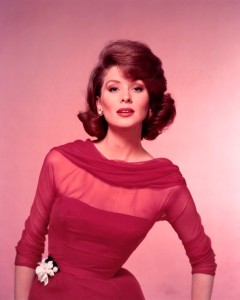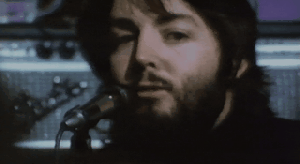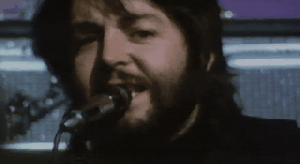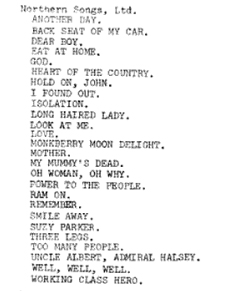Almost fifty years have passed, and we’re still unsure of how the Beatles’ ditty “Suzy Parker” came about. But the origin story for “Penina” — discussed and introduced by Paul McCartney a few hours after the somewhat mysterious performance of “Suzy Parker” — quite literally appeared in print on the very day we’re discussing, January 9, 1969, in the Daily Express.
“Penina” is usually lumped into the pile of Lennon/McCartney songs given away to other artists. Why, you may have seen it on the 1979 EMI compilation “The Songs Lennon And McCartney Gave Away,” alongside far more notable tracks like Peter & Gordon’s “World Without Love” and Billy J. Kramer’s “Bad to Me.” Those were No. 1 hits. “Penina” wasn’t even released in the U.K. or U.S.
So how does “Penina” fit in and how did it come that Paul is the sole author?
Paul, who vacationed in Portugal in mid-December 1968 with Linda Eastman, her daughter Heather, and Beatles biographer Hunter Davies — a trip highlighted by Paul proposing to Linda and her discovery she was pregnant with Mary — recounted a story of showing up drunk at La Penina, a hotel resort, one night around midnight.

“See the bit in the paper where it said about me giving a song to some group, in William Hickey this morning?” Paul asked the rest of the group a little bit after lunch.
As printed in that day’s Daily Express, under the headline “Beatle Paul writes a £20,000 holiday tip”:
McCartney had spent an evening listening to the resident band at the resort’s luxury Penina Golf Hotel. He decided to give a tip in appreciation. And composed a few bars — called Penina — for the lucky bandleader, Anibal Cunha. To help them along McCartney beat out the rhythm on the drums.
Paul elaborated: “And I sat in on drums, and they said, ‘Give us a song.’ So I said, OK.”
Good lord, is that all it takes? Someone get me in the same room as Paul McCartney, I have absolutely no good material.
“’I’ve been to Albufera, had a great time there,’” Paul sang before continuing to describe the scene. “It was called La Penina, the hotel. And they were all digging it and singing along, and it was good. And William Hickey [in the paper] said he’s giving away this 20,000-pound song.”
Per the paper’s report:
As the shareholders of Northern’ Songs (currently standing at 33s. a share) know, McCartney compositions never fail to net £20,000 at the very least.
…
Northern Songs shareholders in fact are presently benefiting from a rif, “Ob-La-Di, Ob-La-Da,” John Lennon and Paul McCartney borrowed-from another performer, Jimmy Scott. The Marmalade version of this song topped the hit parade this week for the first time.
Paul didn’t mask his disgust with the report:
“Cunts. That’s what you write something, for a riff. You don’t say ‘hello,’ and you haven’t got a riff when you say ‘hello.’ That’s the riff I got off of Jimmy Scott, those two words (“Ob-la-di, Ob-La-Da”). You’d think I’d taken his life. It’s not as though he wrote the song.”
This wasn’t the only time on these tapes Paul would show his frustration with Jimmy Scott regarding ownership of “Ob-La-Di, Ob-La-Da.” Over the years, however, Paul’s softened his view on Scott. This is from just weeks ago, during his promotional tour for Egypt Station:
Meanwhile, back in 1969, the newspaper report continued, quoting Apple press officer Derek Taylor:
“John and Paul saw him right,” says Mr. Taylor. “They, are themselves often asked for help on their travels. And it just isn’t possible for them to refuse.”
Having only heard of “Penina” from the newspaper and Paul’s own recollection, the rest of the group finally had their chance to hear — and participate — in what would be the lone known Beatles performance of the song.” Paul has a vague memory of the lyrics, and the rest of the group clearly has no idea how the song goes (this is in deep contrast to “Suzy Parker,” by the way, lending more support to the argument that song wasn’t a pure improvisation). Here’s how they sounded:
It’s not quite “Eleanor Rigby” — it’s hardly “Wild Honey Pie” (or “Fuh You” for that matter, to evoke Egypt Station again). But it’s a Paul McCartney original and from the same moment in time he was writing songs like “Let It Be” and “The Long and Winding Road” so it deserves to be at least more than a footnote.
Been to Albufeira, I had a few drinks there
And now I’m on my way home
I really don’t care
La Penina, La Penina, La Penina hotel
Well it’s been a long road …
OK, maybe that could be a footnote. (Albufeira, by the way, was where Paul wrote the lyrics to “Yesterday” in 1965. How’s that for a footnote?)
When the song was finally released a few months later — by Anibal Cunha’s band, Jotta Herre — the sleeve proudly trumpeted the Beatle’s songwriting credit. And it’s a lone McCartney credit, not Lennon/McCartney. The eventual lyrics have just three verses, with the final one ending with a first-person reference. It’s a languid offering, plaintive at best sporting simplistic lyrics that recap the evening sung over a bland melody.
(Chorus)
Penina, Penina, Penina one night
Penina, Penina, Penina one nightI’ve been to Albufiera
And I had a good time there
And then I came to Penina
And found good friendsDrinking liquid, making music
Love has come to my heart
Beat the drums take me home
Helping friends free my soulTime has come, time has gone
Time to bet for keeping friends
Take my arm girl, lets go home
Thank you all, love from Paul
In challenging the report that it was a £20,000 song, Paul was clearly giving the song little merit in January 1969. After all, it was just a riff!
In short time, however, Paul was interested in taking a little bit of ownership in “Penina,” starting soon thereafter with his blessing the band to use his name as a promotional tool.
In an interview with a Portuguese magazine published in July 1969 and beautifully titled “Jotta Herre — the godchildren of Paul McCartney,” Cunha disclosed further communication with the bearded Beatle.
Translated, roughly, from Portuguese to English via Google Translate:
I have only one thing to regret, and we must involve the name of Paul McCartney and the friendship he gave us. But, in truth, he also forced us to do so. And in a letter he sent us he tells us categorically. “Use my name without hesitation, let it be used for your publication.” And, finally, the commercial entities linked to the release of the album knew this and took advantage of the idea. Well Paul’s name has a made market and it is assumed that it will be commercially valid.
The song was not really that commercially valid, to use that term. Neither the original version nor a subsequent cover that year by two-time Portuguese Eurovision contestant Carlos Mendes — whose cut appeared on the aforementioned EMI compilation — appears to have made much of a dent in sales, despite the McCartney name behind the song. Perhaps it was the quality of the song that played a role.
A quarter century later, in a 1994 interview in his Club Sandwich fan club magazine, Paul sounded like there was more to the story than perhaps there was:
I went to Portugal on holiday and returned to the hotel one night slightly the worse for a few drinks. There was a band playing and I ended up on the drums. The hotel was called Penina, I made up a song with that name, someone made enquiries about it and I gave it to them. And, no, I shouldn’t think I’d ever record it myself!
The Summer 1995 issue of the same magazine likewise listed “Penina” among the songs Paul gave away, chronologically listed between bona-fide hits “Goodbye” (Mary Hopkin) and “Come and Get It” (Badfinger), showing a breathtaking contrast of song quality with his Portuguese throwaway.
To this day, Paul still hasn’t recorded “Penina,” but the song lives on. Mendes re-recorded it for his latest LP, which came out in April 2018.
And while “Suzy Parker” lives on only through bootlegs and YouTube clips, having become the actual footnote in Beatles lore, you can see the 71-year-old Mendes perform “Penina” live in concert in Portugal this December, nearly 50 years to the day Paul wrote the song a few hours away at the Penina Hotel and Golf Resort.





